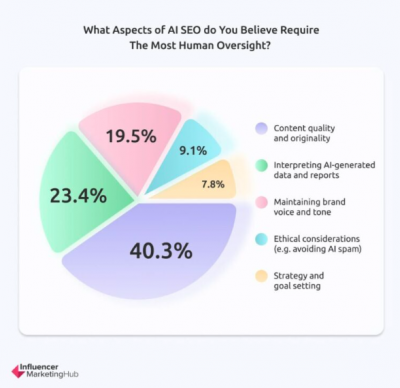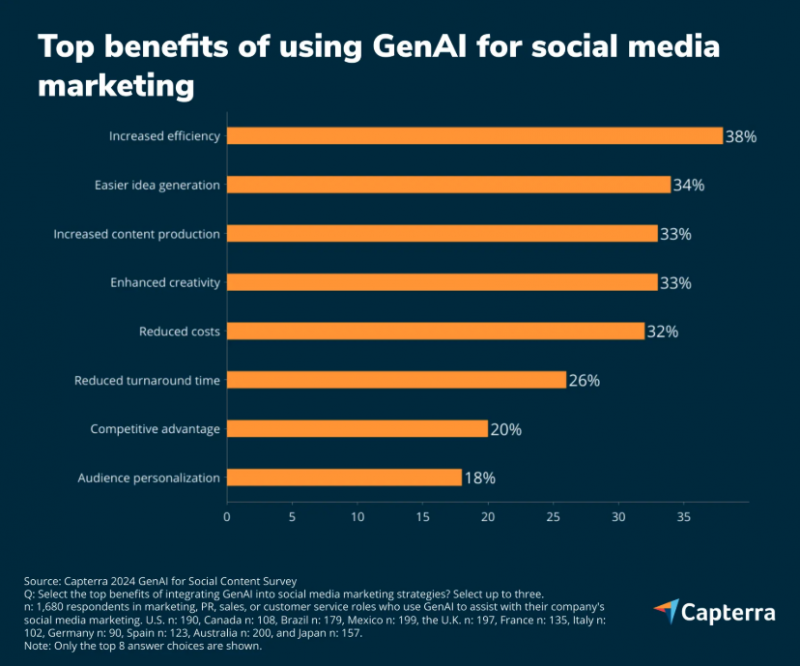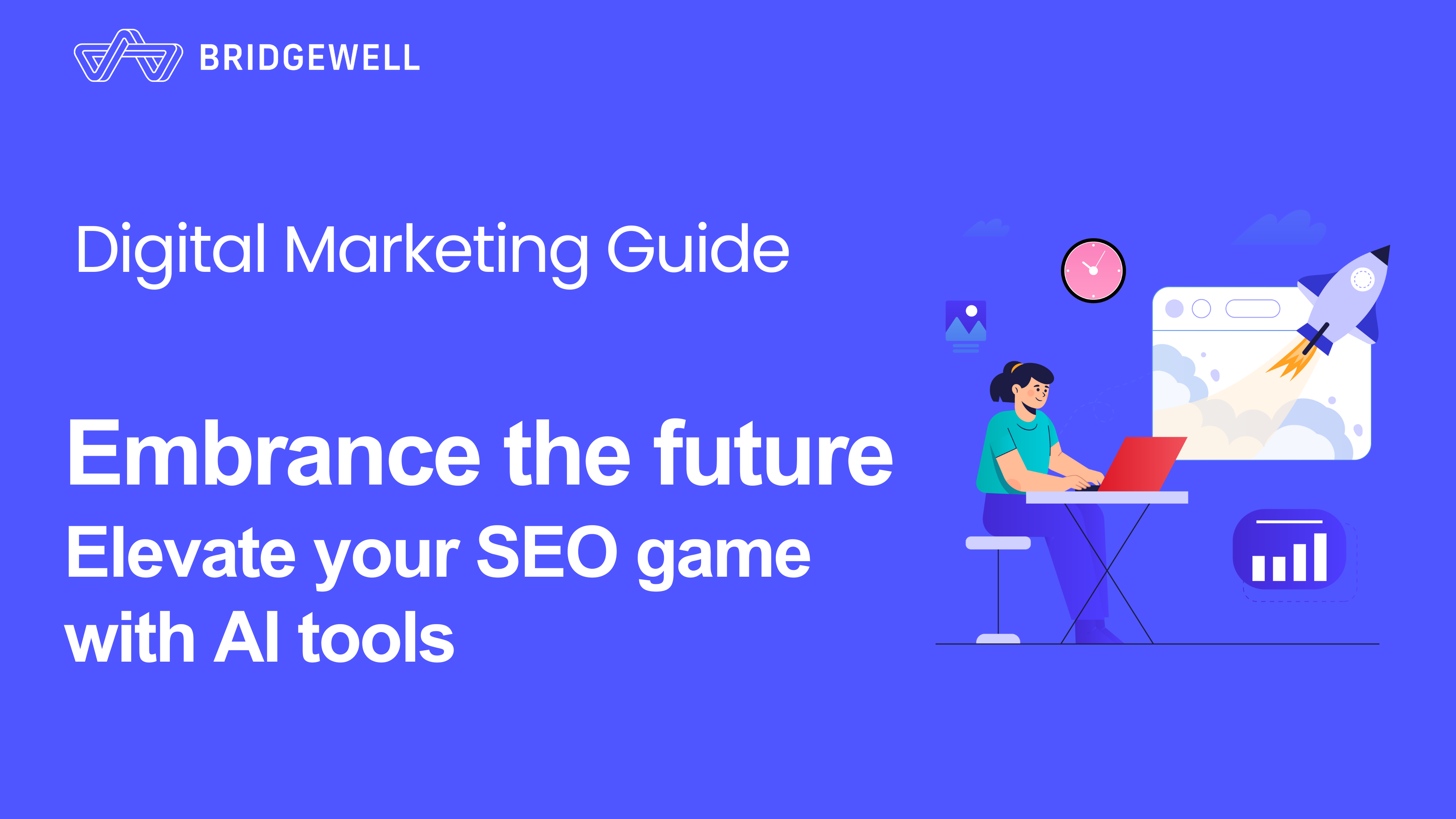Digital marketing is rapidly evolving into a data-driven, algorithm-powered landscape, and leveraging AI is key to staying ahead. By adopting AI-driven SEO insights, you’re not just optimizing your marketing strategy—you’re building a long-term competitive edge that positions your business as an industry leader in the ever-changing digital world.
Embracing Future Trends:
Boost SEO Performance with AI-Powered Strategies
–
Search engine optimization (SEO) is the foundation of increasing online visibility. However, as search engine algorithms continuously evolve, SEO has become a constantly shifting game where marketers must adapt their strategies to stay competitive. This is where artificial intelligence (AI) comes into play.
The combination of AI and SEO creates a powerful synergy—blending human adaptability with machine precision. In the past, marketers relied on experience and testing to decode algorithm changes. Now, AI-driven machine learning can quickly analyze patterns, helping brands adapt faster and more effectively. In other words, leveraging AI for SEO ensures brands stay ahead in competitive search rankings.
As AI transforms SEO, digital marketing enters a new era. This article explores how AI enhances SEO, from keyword research and content creation to site optimization, empowering brands to dominate the digital landscape.
–
What is AI SEO?

Credit: Influencer Marketing Hub
–
AI SEO (Artificial Intelligence Search Engine Optimization) is transforming the game of digital marketing. Simply put, AI enables machines to simulate human intelligence, including learning, reasoning, and problem-solving. Meanwhile, SEO focuses on optimizing website content to rank higher on search engine results pages (SERPs). When AI and SEO combine, machine learning and data analysis make SEO strategies smarter and more efficient.
AI is revolutionizing how SEO works, allowing marketers to analyze vast amounts of data with unprecedented speed and accuracy. Machine learning algorithms can identify patterns, trends, and correlations, helping us gain deeper insights into user behavior, search trends, and competitor strategies. This data-driven approach enables more informed decision-making and real-time adjustments to SEO strategies based on search engine algorithm changes and user needs.
The benefits of AI SEO are extensive. AI tools automate time-consuming tasks such as keyword research, content optimization, and link building, freeing up marketing teams to focus on strategy and creativity. Additionally, AI algorithms provide real-time performance tracking and data-driven insights, allowing for continuous SEO optimization. Most importantly, AI SEO is highly scalable—whether for startups or large enterprises, machine learning empowers brands to compete effectively in the digital landscape.
–
How AI is Revolutionizing Keyword Research
AI-powered keyword research tools are changing the game by using machine learning and natural language processing (NLP) to analyze massive amounts of data and pinpoint high-value keywords. These tools don’t just speed up the research process—they help marketers zero in on keywords with the highest potential to drive organic traffic, making SEO strategies more precise and effective.
But AI doesn’t stop at keyword discovery. It also optimizes how keywords are used by analyzing search intent, trends, and competitor strategies. By leveraging NLP, semantic analysis, and predictive modeling, AI can understand the deeper meaning behind search queries, ensuring that chosen keywords truly align with what target audiences are looking for.
For example, imagine a sportswear brand wants to improve its SEO strategy. AI can identify trending keywords like “best running shoes” or “compression leggings” by analyzing real-time search trends and user behavior. By understanding the intent behind these searches, the brand can create content and ads tailored to active consumers, increasing engagement and conversions.
AI is also exceptional at uncovering long-tail keywords—phrases that may have lower search volume but higher conversion rates. Instead of competing for broad, high-competition keywords like “sportswear,” AI might identify more valuable, niche-specific terms such as “moisture-wicking women’s running top” or “best marathon compression socks.” When runners search for the perfect gear, an AI-optimized website targeting these terms has a much better chance of ranking higher and capturing those ready-to-buy consumers.
AI-driven keyword optimization is more than just finding obvious high-traffic terms—it’s about strategic advantage. Imagine your biggest competitors dominating all the top-ranking keywords, making it seem impossible to break through. AI can analyze their SEO strategy and identify missed keyword opportunities—terms they’re overlooking but still valuable for your target audience. Whether it’s alternative phrasing, lower-competition keywords, or emerging trends, AI helps you find gaps in the market and create a smarter, more competitive SEO strategy to outrank competitors.
–
How AI Enhances SEO Content Creation

Credit: Capterra
–
Content marketers juggle multiple projects daily, all while producing engaging, SEO-friendly content that attracts the right audience and drives traffic. AI-powered content generation tools make this process more efficient by automatically generating topic ideas, outlines, and even full articles based on target keywords and audience preferences. These tools analyze search engines, social media, and forums to identify trending topics, relevant keywords, and frequently asked questions—helping marketers stay ahead of industry trends.
If you’re responsible for SEO content writing, AI-generated content can help streamline production. With AI, you can create high-quality, optimized content that not only engages readers but also improves search rankings.
Once your content is ready, AI further enhances SEO performance by analyzing and suggesting improvements. It can optimize keyword density, metadata, readability, and headings, ensuring your content aligns with search engine algorithms and user intent.
AI leverages Natural Language Processing (NLP) to understand the context and meaning behind search queries, ensuring your content effectively addresses user needs and concerns. Additionally, AI-driven semantic analysis helps integrate relevant keyword variations, making your content more comprehensive and authoritative—boosting search engine rankings.
Beyond content creation, AI improves user experience through personalized content recommendations. By analyzing visitor interests, behavior, and browsing history, AI suggests relevant articles, videos, or products tailored to each user. As visitors continue engaging with the site, AI refines recommendations, increasing session duration and conversion rates, whether for newsletter sign-ups, purchases, or inquiries. Without AI, many potential customers might leave the site before discovering valuable content or offers.
AI makes SEO content creation smarter and more efficient, playing a key role in planning, writing, optimizing, and enhancing user experience. By leveraging AI, you can create search engine-friendly content that truly resonates with your audience, driving both brand influence and website traffic.
–
How AI Enhances On-Page Optimization
On-page optimization refers to optimizing individual web pages to improve search rankings and attract more traffic. AI is making this process smarter and more efficient, helping with keyword optimization, readability, content structure, mobile experience, and more.
1. AI-Powered Keyword Optimization
Let’s say you’re writing a blog post on healthy eating habits and have included primary keywords, but you’re unsure what additional terms could improve SEO. AI tools can analyze search trends and content relevance, suggest high-value long-tail keywords, and recommend optimal keyword placement to boost visibility.
2. Improving Readability and Engagement
SEO isn’t just about keywords—readability also impacts rankings. If your content is too complex, it may hurt user experience. AI analyzes sentence structure, tone, and engagement data, offering simplification and style adjustments to make your content more readable and engaging, increasing user dwell time.
3. AI-Generated Metadata for SEO
Metadata (title tags, meta descriptions, and H1-H6 headers) plays a crucial role in SEO. AI dynamically adjusts these elements based on search trends and user behavior, making them more compelling. For example, if you’re writing a product description for a fitness tracker, AI can continuously optimize titles and descriptions to boost click-through rates (CTR).
4. AI-Optimized Image SEO
Image search is a powerful way to drive traffic. If you upload product images for a hiking backpack, AI can suggest optimized alt text and tags, improving visibility in search results and enhancing accessibility.
5. Optimizing Content Structure for Search and Readability
A well-structured article enhances both user experience and search engine indexing. If you’re writing a guide on popular hiking trails, AI can suggest the best way to break it into sections and subheadings, making it easier to read and rank higher.
6. AI-Driven Mobile SEO Improvements
Mobile user experience (UX) directly impacts SEO rankings. AI analyzes page speed, layout, and responsive design, providing optimization recommendations to ensure your site performs well in mobile search results, driving more mobile traffic.
7. AI-Powered Personalized Content Recommendations
Personalization is key to boosting conversions and engagement. AI-driven recommendation engines analyze user behavior, interests, and demographics to suggest relevant content or products. For instance, if a visitor is browsing hiking gear, AI can recommend related products or articles, increasing the likelihood of a purchase.
With AI-driven on-page optimization, websites can create SEO-friendly, high-performing pages that improve search rankings, user experience, and conversions—giving brands a competitive edge in digital marketing.
–
How Will AI Shape the Future of SEO?
Looking ahead, AI is set to drive major transformations in SEO. As technology advances, AI-powered SEO trends will reshape the industry landscape. Here are key predictions for the future of SEO:
Prediction 1: AI-Optimized Voice Search
With the rise of voice search and conversational queries, AI-driven natural language processing (NLP) algorithms will play a crucial role in optimizing content for voice-based searches. Marketers will need to adapt SEO strategies to ensure content structure and language align with voice search algorithms, improving search visibility and rankings.
Prediction 2: Predictive Analytics for SEO Strategy
AI-powered predictive analytics will enable marketers to anticipate search algorithm updates, user behavior trends, and industry shifts with greater accuracy. This will allow brands to proactively adjust SEO strategies, stay competitive, and capitalize on emerging market opportunities. Additionally, AI-driven personalization will enhance content relevance, boosting engagement and conversion rates.
Prediction 3: Advancements in Visual Search Optimization
As visual search technology continues to evolve, AI will play a key role in optimizing image-based search results. AI-driven image recognition algorithms will help marketers enhance metadata and tagging for images, making them more discoverable in search results. Furthermore, AI-powered visual search engines will deliver more accurate, contextually relevant search results, improving user experience.
Prediction 4: Ethical AI and Algorithm Transparency
As AI algorithms gain more influence over search rankings, there will be increased demand for transparency and ethical AI practices in SEO. Businesses must clearly communicate how AI is used in their SEO strategies, ensuring compliance with ethical standards and data privacy regulations to maintain trust with users and partners. Additionally, companies should invest in cybersecurity measures such as encryption, authentication protocols, and regular security audits to prevent data breaches and unauthorized access.
As AI continues to shape SEO, staying ahead of these trends will be critical for brands looking to adapt, innovate, and maintain a competitive edge in the evolving digital landscape.
–
Embrace AI and the Future of SEO
Digital marketing is rapidly evolving into a data-driven, algorithm-powered landscape, and leveraging AI is key to staying ahead. By adopting AI-driven SEO insights, you’re not just optimizing your marketing strategy—you’re building a long-term competitive edge that positions your business as an industry leader in the ever-changing digital world.
